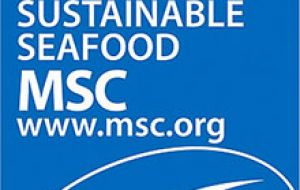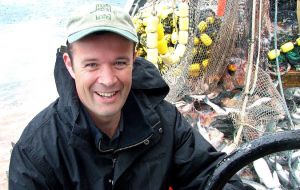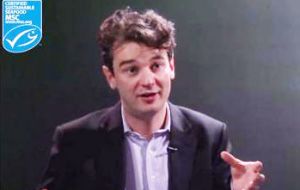MercoPress. South Atlantic News Agency
Ocean leaders on track to achieve nine million tons of MSC sustainable seafood
 MSC certified fisheries now catch 8.8 million tons of MSC certified seafood per year, accounting for close to 10% of the total global wild-capture
MSC certified fisheries now catch 8.8 million tons of MSC certified seafood per year, accounting for close to 10% of the total global wild-capture  “By putting sustainability at the heart of their business strategy, these leaders are driving positive change” said CEO Rupert Howes.
“By putting sustainability at the heart of their business strategy, these leaders are driving positive change” said CEO Rupert Howes.  Nicolas Guichoux pointed out that MSC growth forecasts include markets for tuna and small pelagic fisheries, which represent 30% of total marine catches.
Nicolas Guichoux pointed out that MSC growth forecasts include markets for tuna and small pelagic fisheries, which represent 30% of total marine catches. The Marine Stewardship Council (MSC) celebrated this Wednesday 15 years of MSC certified seafood and recognized the ‘leaders for living oceans’ that are driving growth and success in the sustainable seafood market.
MSC certified fisheries now catch 8.8 million tons of MSC certified seafood per year, accounting for close to 10% of the total global wild-capture. With 255 fisheries certified and over 100 currently in assessment to the MSC Standard, volumes could increase to over 10 million tons, representing around 12% of the global wild harvest, in the next 18 months.
Speaking at the MSC’s annual Global Commercial Update Meeting at Seafood Expo Global, Chief Executive Officer, Rupert Howes and Global Commercial Director, Nicolas Guichoux acknowledged the commitment shown by organizations around the world. The MSC commended processors, retailers and restaurants such as Orkla Foods in Sweden, Anova Seafood in the Netherlands, Iglo Foods Group in Europe, award winning UK restaurant Wahaca, Aeon in Japan, Sainsbury’s in the UK and Migros in Switzerland, among others, for embedding sustainability in their business.
“By putting sustainability at the heart of their business strategy, these leaders are driving positive change. Their leadership is helping propel the global sustainable seafood movement, and fuel responsible consumption by empowering those who are seeking sustainable choices,” said Rupert Howes.
Today more than 600,000 metric tons of MSC labeled products are sold every year to consumers in 100 countries around the world. These figures represent a significant growth in sustainable seafood availability compared to just 15 years ago when the very first fishery achieved MSC certification. This fishery, the Western Australian Rock Lobster fishery, has since experienced improvements in financial stability and eliminated its unintended impacts on an endangered species.
Around 65,000 tons of MSC certified lobster was caught globally last year. By comparison there were around 10,000 tons of MSC certified lobster caught in 2012. This increase is the result of Northern American lobster fisheries achieving MSC certification in the last two years. 85% of lobster landed in the US is now eligible to carry the MSC eco-label, whilst 97% of lobster landed in Canada is either certified or in assessment in the MSC program.
Nicolas Guichoux also pointed to areas where the MSC forecasts growth over the coming year. These include the markets for tuna and small pelagic fisheries, which together represent around 30% of total marine catches.
More MSC certified tuna is entering the market and more tuna fisheries are eager to join the MSC program, and meet the sustainability requirements under the MSC Fisheries Standard. Volumes of certified seafood from small pelagic fisheries and by product from MSC certified fish are increasing in order to supply demand driven by food supplement and pet food industries together with responsible aquaculture schemes such as the Aquaculture Stewardship Council (ASC).
Nicolas Guichoux concluded: “We have achieved a lot, but there is still a great deal more to do to ensure healthy oceans and a thriving sustainable seafood market for the future. We encourage other organizations to follow the leadership of those in the MSC program who are making a positive impact through their responsible stewardship and purchasing power.”




Top Comments
Disclaimer & comment rulesCommenting for this story is now closed.
If you have a Facebook account, become a fan and comment on our Facebook Page!